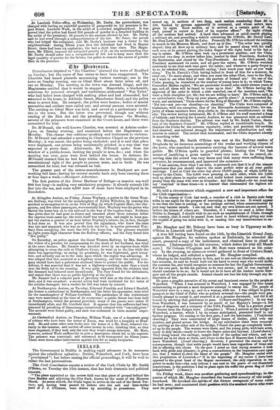1.)e Vrobliites.
Disturbances imputed to "the Chartists" alarmed the town of Bradford on Sunday; but the cause of fear seems to have been exaggerated. The Chartists had issued placards announcing various meetings; one in the town on Sunday evening, one on Odeal Moor about three miles off, and one on Monday. The meeting in the town was deemed illegal, and the Magistrates notified that it would be stopped. Meanwhile, a blacksmith, notorious for personal strength and turbulence, nicknamed " Wat Tyler," who had before been charged with making pikes and had absconded, had returned to his home, in Adelaide Street, Manchester Road; and the police went to arrest him. He escaped; the police were beaten; bodies of special constables and soldiers were called out; and several persons were arrested. The meeting on Odsal Moor was held, and served as a preliminary to the one in the town. But the latter was prevented, though not without reading of the Riot Act and the parading of dragoons. On Monday, several of the prisoners were examined at the Court-house, and three were committed for trial.
Dr. M`Douall, the well-known Chartist, was arrested at Ashton-under- Lyne, on Sunday evening, and examined before the Magistrates on Monday. The charge was seditious speaking and incitement to violence. Dr. M'Donall had attended a meeting in Charleston Chapel on the previous Monday; it was secret, the police being excluded; and it is said that pikes were displayed, one person being accidentally pricked in a way that was expected to prove fatal. Afterwards, Dr. M`Douall spoke from the window of a public-house, inciting the people to arm, &c.; and when the meeting was over' guns were fired behind the house. In defence, Dr. M`Donall insisted that he had kept within the law, only insisting on the constitutional right of the people to possess arms, and so forth. He was committed for trial, but was released on bail.
The greater part of the ootton-manufacturers in Stockport are now working full time; having for several months back only been running three Or four days a week.—Stoekport Advertiser.
The first portion of the Dover Harbour of Refuge—a massive sea-wall 800 feet long—is making very satisfactory progress: it already extends 130 feet into the sea, and some 4,000 tons of stone have been employed in its foundation.
M Abingdon Assizes, on Friday, James Weybary, a porter to the Great West- ern Railway, was tried for the manslaughter of Edwin Wiltshire, by causing the accident to an express-train on the 10th of May, by which Captain Hart, two cler- gymen, and five other passengers, were mortally hurt. Weybury was the porter who moved the horse-box on to the railroad in the way of the express-train. Evidence was given that he had gone to dinner and returned about three minutes before the express-train came up: the train itself was very late, and ought to. have pas- sed the station a quarter of an hour before Weybury's return; he, in fact, thought it had done so. It was also proved that the signalman, who knew the train was late and unpassed, who was on the look out for it, in nowise prevented Wey- bury from occupying the main line with the horse-box. The prisoner received an eight-years high character from the Railway officers; and the Jury found him
Not guilty."
On Saturday,. an action against the Great Western Railway, by Mrs. Sumner, the widow, of a jeweller, for compensation for the death of her husband, was tried at the same Assizes. Mr. Smaner was knocked down by an express-train while attempting to cross the rails at Challows Cross; he went on to the line while the train was approaching; on seeing its proximity, he was frightened, grew irreso- lute, and actually ran on to the rails upon which the engine was advancing. It was alleged that this occurred at a highway crossing, and that the railway com- pany should have had a policeman stationed there to protect the public. For the defence, it was asserted that it was not a highway—nothing more than a track over the fields led to the crossing. It was quite apparent from the evidence that the deceased had behaved most incautiously. The Jury found for the defendants, and stated that there was no public highway at the place. Mr. Smaller had a valuable pack of jewellery with him at the time of the acci- dent, and it was smashed: a second action had been instituted for the value of the articles damaged; but a verdict for 501. was taken by consent.
At Northampton Assizes, on Tuesday, Edmund Franklin and Edward Randall, the former a confectioner in Northampton and the latter his apprentice, were tried for the manslaughter of William Corrfield. The particulars of this unfortunate case were mentioned at the time of its occurrence: a public dinner had been held at Northampton, which the accused provided; many of the guests were taken ill immediately after, and Mr. Corrfield died. It appears that the sufferers had been poisoned by partaking of blancmange incautiously coloured with "emerald green." The accused were found guilty, and each was sentenced to three months' impri- sonment.
At Chelmsford Assizes, on Thursday, William Wade, one of a desperate gang of robbers who have been the terror ot Essex, was tried for a burglary at Brad- well. He and some other men broke into the house of a Mr. Ham, behaved vio- lently to the inmates, and carried off some money in coin; thinking that, as they were disguised, if they took only the coin they would escape detection. Mr. Ham, however, noticed Wade sufficiently to give a description which led to his capture. The prisoner was convicted; and sentenced to be transported for fifteen years. There were three other indictments against him for as many burglaries.


























 Previous page
Previous page